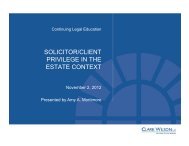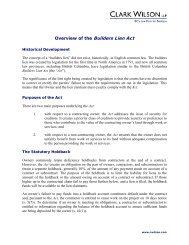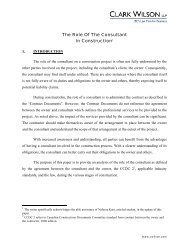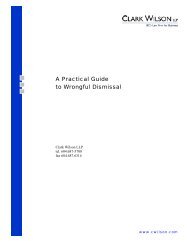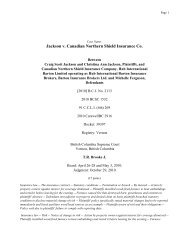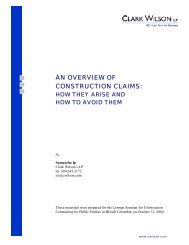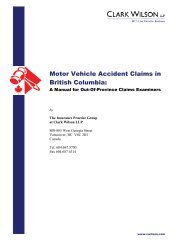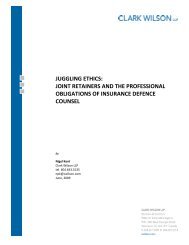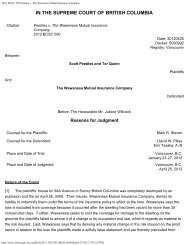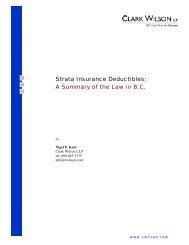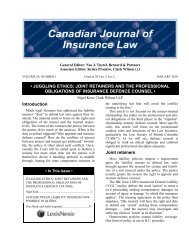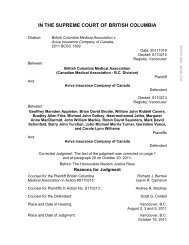You also want an ePaper? Increase the reach of your titles
YUMPU automatically turns print PDFs into web optimized ePapers that Google loves.
Kruger Products Limited v. First Choice Logistics Inc. Page 24<br />
I am satisfied that the landlord-tenant and construction project cases that<br />
have found a bar to subrogation can be distinguished from cases involving<br />
bailor and bailee. A warehouser does not have a generalized property<br />
interest in the goods which it stores. On the other hand, tenants have an<br />
insurable interest in the continuing existence and availability for use of<br />
demised premises. Similarly, the insurable interest of all trades and<br />
subtrades in a construction project is obvious and was recognized in<br />
Commonwealth Construction Co. v. Imperial Oil Ltd., [1976] 1 S.C.R. 317.<br />
[At para. 205; emphasis added.]<br />
[49] On a policy level, the trial judge was also of the view that barring the<br />
subrogated action would impair the duty of care owned by FCL to Scott, contrary to<br />
s. 2(4)(b) of the Warehouse Receipt Act. He noted that there were no Canadian<br />
cases on point, but that in two American decisions, Brown v. Sloan’s Moving &<br />
Storage Co., 296 SW2d 20 (S.C. Mo., 1956) and Kimberley-<strong>Clark</strong> Corporation<br />
v. Lake Erie Warehouse, Division of Lake Erie Rolling Mill Inc. 375 NYS2d 918, 49<br />
A 2d 492 (S.C., App. Div.), the courts had declined to give effect to clauses requiring<br />
a bailor to obtain its own insurance, on the basis that the bailee should not be<br />
exempted from its contractual or statutory duties of care. As well, the trial judge<br />
said, disallowing the subrogated claim in this instance would “make meaningless”<br />
the indemnification provisions at para. 12 of the WMA, under which each of Scott<br />
and FCL had covenanted to hold the other harmless from all losses and claims<br />
arising, inter alia, from property damage ‘related to’ the negligence of the other.<br />
Given the policy implications of barring a party from enforcing its rights to indemnity,<br />
he suggested that very clear and specific language would be required for that<br />
purpose.<br />
2013 BCCA 3 (CanLII)<br />
[50] In the result, he held that there was no bar to the subrogated claim against<br />
FCL. The claim was allowed as against both defendants, with damages to be<br />
assessed at a later date.<br />
On Appeal<br />
[51] In this court, the defendants submit that the trial judge erred in declining to<br />
apply the “covenant to insure” principle established by the trilogy and in particular, in<br />
distinguishing bailment situations from the landlord-tenant and complex construction



